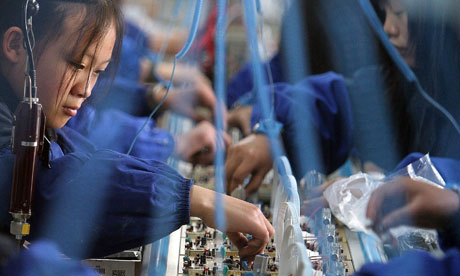If there was a pub where you could drink your fill and leave the hangover with the landlord, would you go there? Idle dreaming, but this is the deal in the world of carbon accounting, where responsibility is shared out among countries, and targets set for reducing greenhouse gas emissions.
If I want to own and enjoy a cheap, garage-sized TV, all the fossil fuel emissions that result from making it don't get added to my home account, but to the country of manufacture, most probably China.
As a result, the origins of demand and the place of consumption become insulated from environmental consequences.
Worse still, as the latest, most comprehensive set of figures on the hidden trade in "embodied carbon" reveal, it allows countries such as the UK and the US to delude themselves, by suggesting that the real problems in tackling climate change lay elsewhere, and to dangerously misunderstand the scale of domestic challenges.
It allows us to think that, even if too slowly, we are heading in the right downward direction in terms of our emissions. When in fact the more comprehensive, latest figures reveal that the UK's CO2 emissions didn't fall by 28m tonnes between 1990 and 2008 at all, as the official record indicates, but rose by a substantial 100m tonnes. Rich country emissions went up 12% over the period when hidden, traded emissions are included, and anomalies such as Russia, whose economy collapsed in the early 1990s, are left out.
Trade's share of the global economy increased steadily in the last two decades and, in tandem, emissions from the production of traded goods and services rose from one fifth to more than one quarter of global CO2 emissions.
The UK has targets under the Kyoto protocol, and legal obligations under the Climate Change Act to reduce emissions. But the benchmark against which those targets and obligations are set excludes this "off-shored" carbon. Using a faulty accounting system creates a kind of Alice in Climate Wonderland world in which up is down, the wrong people take the blame and the kingdom is never put in order.
Enter the government's "green deal", a centrepiece of the coalition's pledge to be the greenest government ever, which is about to arrive for scrutiny in the House of Commons.
Like a spoon of sugar at the Hatter's tea party, it will allow motivated households to install home insulation and pay off the cost over time through their fuel bills.
Parliament's environmental audit committee is currently investigating whether there are contradictions between how the UK addresses climate change in its aid programme, and how we behave at home.
The contradiction is so large that perhaps it is difficult to see. It is the economic model itself. It demands ever more damaging over-consumption by the already rich to deliver shrinking, unreliable benefits to the poor. It's a model in which most benefits accrue to the former, yet without significantly improving life satisfaction, and costs, to the latter. Economic insult is merely added to environmental injury that a large proportion of our current carbon debts (let alone larger historical ones) are borne by others because of an accounting quirk.
Other downright peculiarities emerge, such as the boomerang trade ,which sees the UK importing and exporting often near identical amounts of goods, like sending 5,000 tonnes of toilet paper to Germany, then importing 4,000 tonnes.
Apart from failing on its own terms and being distorted by faulty measurement, the model – rising overall consumption fuelled by debt and export-led development – assumes endless supplies of cheap oil and infinite natural resources. Neither are available.
Last week saw commentators obsessed with minor fluctuations in the UK's GDP, a measure of the quantity, not quality, of economic activity. "Recovery" has become synonymous with the return of rising consumption. In trying to revive a flawed and failing economic order, however, we appear as sad romantics, rather like those diehard Russians who still dream with misplaced memories of a golden age, for the return of the tsars or "strong" communist party leaders, rather than looking forward and imagining how the world could be different, better.

